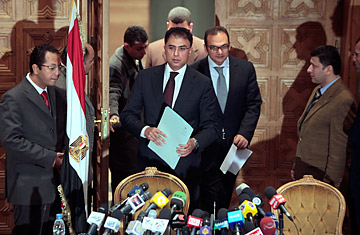
Egyptian investigative judges Sameh Abu Zeid, right, and Ashraf el-Ashmawi, who are investigating the foreign funding of NGOs, enter a press conference at the Justice Ministry in Cairo on Feb. 8, 2012
Was this the telltale evidence? Egyptian authorities say they found maps in the offices of raided pro-democracy NGOs, the country's Justice Ministry told reporters on Wednesday. Maps that divided Egypt into zones. Maps containing English writing. "We found a number of maps scribbled on in English and divided into four parts," one of the investigating judges, Sameh Abu Zeid, told reporters at a press conference. "However, these are still being investigated." The potentially incriminating evidence cited by the Justice Ministry in the quickly escalating criminal prosecution of 19 Americans and 24 other foreign and local NGO workers might sound laughable by American justice standards. But it's not a laughing matter in Egypt. It's quite serious when it comes to the future of one of the U.S.'s most important bilateral relationships in the Middle East.
The Egyptian government's ongoing crackdown on 10 NGOs — including prominent Washington-based democracy-promotion groups Freedom House, the International Republican Institute (IRI) and the National Democratic Institute (NDI) — has angered U.S. lawmakers and is threatening to undermine a decades-long partnership with the Arab world's largest country, involving billions of dollars in American aid.
For Egypt's ruling generals, however, the diplomatic contretemps may not be a smartly calculated move in international chess; it is more likely to be domestic propaganda gone awry. "If we assume that they are well-organized and clever tacticians, then it is really hard to understand what they're doing. But that might not be the case," says Michelle Dunne, a Middle East expert at the Atlantic Council, a Washington think tank. "I really think they might have gotten themselves into a situation that has become more of a confrontation with the United States than they perhaps anticipated."
Egyptian authorities raided the 10 NGOs last month. But the crackdown began in the chaotic aftermath of President Hosni Mubarak's ouster. Faiza Aboul Nega, the minister who coordinates international aid and a Mubarak holdover, began to raise suspicions about foreign funding — and particularly American funding — of NGOs in Egypt. She encouraged state media to publish lists of activist groups and NGOs that had received U.S. funding, igniting a popular witch hunt that even affected liberal groups like the April 6 Youth Movement, which had briefly enjoyed some popularity for leading the antiregime uprising. Within months, Dunne says, the media campaign had snowballed. "It really started to spin up, until it became an official government investigation," she says. "And by the fall of last year, it had really taken on a bureaucratic life of its own."
The Justice Ministry launched a formal investigation into organizations — both Egyptian and American — that it alleged had received U.S. funding late last year. It searched bank accounts, ramped up the rhetoric and, on Dec. 29, raided NGO offices in the most aggressive attack on U.S. interests in Egypt in decades. On Feb. 5, the government announced that 43 people, including Sam LaHood, head of the IRI and the son of President Obama's Transportation Secretary, had been placed on a no-fly list, pending trial. Some of the Americans have taken refuge at the U.S. embassy. And on Wednesday, investigating judge Sameh Abu Zeid told reporters that investigators had collected 160 pages of evidence so far. "There is a lot of evidence, some of it dangerous," he said. He cited findings that one of the NGOs under investigation had sought to launch an online page that identifies the location of certain churches as well as army units. It's unclear why that activity would be considered illegal, but the charge is consistent with a broader conspiracy theory propagated by the military-led regime over the past year that foreign hands are seeking to destabilize the country. Responding to the mounting crisis, U.S. Army General Martin Dempsey, Chairman of the Joint Chiefs of Staff, is set to travel to Egypt later this week to push for the charges to be dropped.
